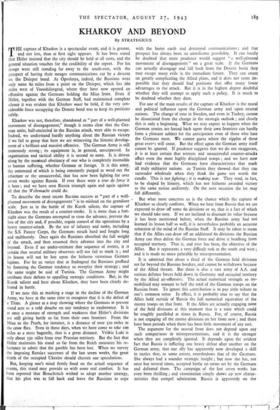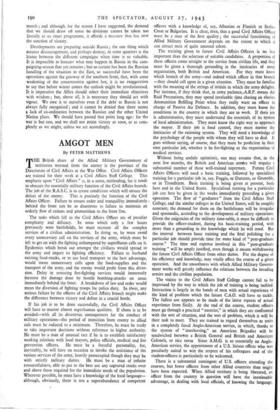KHARKOV AND BEYOND
By STRATEGICUS THE capture of Kharkov is a spectacular event, and it is greater, and not less, than at first sight appears. It has been stated that Hitler insisted that the city should be held at all costs, and the general situation vouches for the credibility of the report. For his troops were still standing far away to the south-east, with the
prospect of having their meagre communications cut by a descent on the Dnieper bend. At Oposhnya, indeed, the Russians were only some 8o miles from a point on the Dnieper, which lies 26o miles west of Voroshilovgrad, where they have now opened an offensive against the Germans holding the Mius front. Even if Hitler, together with the German Staff, had maintained complete silence it was evident that Kharkov must be held, if the very con- siderable force occupying the Donetz bend was to keep its positions safely.
Kharkov was not, therefore, abandoned as " part of a well-planned movement of disengagement," though it seems clear that the Ger- man units, half-encircled in• the Russian attack, were able to escape. Indeed, we understand hardly anything about the Russian victory if we fail to grasp that here we are witnessing the historic develop- ment of a brilliant and massive offensive. The German Army is still immensely strong ; its equipment is, in general, unsurpassed. In organisation and tactical ability it is second to none. It is driven along by the maniacal obstinacy of one who is completely insensible to human suffering, whether German or foreign. It is this army, the command of which is being constantly purged to weed out the reluctant or the unsuccessful, that has now been fighting for over seven weeks against Russia. If ever there were a tour de force it is here ; and we have seen Russia triumph again and again against all that the Wihrmacht could do.
To describe the most recent Russian success as " part of a well- planned movement of disengagement " is to mislead on the grandiose scale. Just as in the battle of the Kursk salient, the capture of Kharkov was the result of a counter-stroke. It is more than a fort- night since the Germans attempted to stem the advance, prevent the loss of the city and, if possible, regain control of the operations by a heavy counter-attack. By the use of infantry and tanks, including the S.S. Panzer .Corps, the Germans struck hard and fought long and stubbornly. Once again the Russians absorbed the full weight of the attack, and then resumed their advance into the city and beyond. Even if we under-estimate that sequence of events, it is certain that neutral military observers will not fail to mark it ; and its lesson will not be lost upon the hitherto victorious German legions. For let us notice that at Stalingrad the Russians profited by fostering the German tendency to overplay their strategy ; and the same might be said of Tunisia. The German Army might attribute their defeats to appalling strategic conditions. But, in the Kursk salient and here about Kharkov, they have been clearly de- feated in battle.
If we note this as marking a stage in the decline of the German Army, we have at the same time to recognise that it is the defect of a Titan. A glance at a map showing where the Germans at present stand acts as a cold douche on any tendency to exuberance. It is at once a measure of strength and weakness that Hitler's divisions are still giving battle so far, from their own frontiers From the Mius to the Pruth, for instance, is a distance of over szo miles as the crow flies. Even in these days, when we have come to take too. miles as a mere bagatelle, that is a great distance. Velikie Luki is only about 33o miles from true Prussian territory. But the fact that Hitler maintains his stand so far from the Reich measures. his re- luctance to admit that the gamble has been lost. When we survey the imposing Russian successes of the last seven weeks, the great depth of the occupied Ukraine should chasten our speculations.
But,- keeping one's mind firmly fixed on the actual sequence of events, this stand may provide us with some real comfort. It has been reported that Brauchitsch wished to adopt another strategy, that his plan was to fall back and leave the Russians to cope
with the burnt earth and destroyed communications ; and that prospect has always been an unwelcome possibility. It can hardly be doubted that mere prudence would suggest " a well-planned
movement of disengagement " on a great scale. If the Germans can actually disengage and fall back from the Donetz basin they
may escape many evils in the immediate future. They can count on greatly complicating the Allied plans, and it does not seem im- possible that they should find positions that offer many fewer advantages to the attack But it is in the highest degree doubtful whether they will attempt to apply such a policy. It is much to be doubted whether they dare.
For one of the main results of the capture of Kharkov is the moral and political influence upon the German army and upon neutral
nations. The change of tone in Sweden, and even in Turkey, cannot be dissociated from the change in the strategic outlook ; and clearly this is only a beginning. What we may expect to happen when the German armies are forced back upon their own frontiers can hardly form a pleasant subject for the anticipation even of those who hate the Germans most. We cannot guess where the ripples of these great events will cease. But the effect upon the German army itself cannot be ignored. If prudence suggests that we do not exaggerate, it is at least certain that retreats and unsuccessful counter-attacks affect even the most highly disciplined troops ; and we have now had evidence that the Germans have characteristics that mark all truly militarist nations. in Tunisia they showed-that they can surrender wholesale when they think the game not worth the candle. This is not fighting ; it is making war. They tend, in fact, to be shaped by history, which has not hitherto awarded victory to the same nation uniformly. On the next occasion the lot may fall differently.
But what most concerns us is the chance which the capture of Kharkov so clearly confirms. • When we hear from Russia that we are expected to draw off some 6o divisions or so, that is a fact of which we should take note. If we are inclined to discount its value because it has been mentioned before, when the Russian army had not learned its lesson half so well, it is nevertheless probably an accurate reflection of the mind of the Russian Staff. It may be taken to mean that if the Allies can draw off an additional 6o divisions the Russian Army can then defeat the German force and drive it headlong from occupied territory. That is, and ever has been, the objective of the Allies. But it represents a very difficult task in the south and west ; and it is made no more palatable by misrepresentation.
It is admitted that about a third of the German field divisions are far beyond the Russian borders, and cannot be withdtawn because of the Allied threats. But there is also a vast army of A.A. and various defence forces held down in Germany and occupied territory by the Allied air-offensive. The actual numerical strength so im- mobilised may amount to half the total of the German troops on the Russian front. To ignore this contribution is to pay little tribute to one's common sense In effect, it is probably true to say that the Allies hold outside of Russia the full numerical equivalent of the enemy troops on that front. If the Allies are actually engaging none of the field divisions at this moment that is a state which could be roughly paralleled at times in Russia. For, of course, Russia is not engaging all the enemy divisions on her front now ; and there have been periods when there has been little movement of any sort.
The argument for the second front does not depend upon any such comparisons or misrepresentations, and it is the stronger when they are completely ignored. It depends upon the evident fact that Russia is inflicting one heavy defeat after another on the German army, that our ally has apparently now developed a skill in tactics that, to some extent, overshadows that of the Germans. She always had a sounder strategic insight ; but now she has, not once but several times, accepted battle on terms set by the Germans and defeated them. The campaign of the last seven weeks has even been thrilling ; and examination simply shows up new charac- teristics that compel admiration. Russia is apparently on the march ; and although, for the reason I have suggested, the demand that we should draw off some 6o divisions cannot be taken too literally as an exact programme, it affords a measure that has now the sanction of victory.
• Developments are preparing outside Russia ; the one thing which arouses discouragement, and perhaps dismay, in some quarters is the hiatus between the different campaigns when time is so valuable. It is impossible to forecast what may happen in Russia in the cam- paigning-season that yet remains ; but so certain has been the Russian handling of the situation in the East, so successful have been the operations against the gateway of the southern front, that, with some weakening of the concentration against her, it is no exaggeration to say that before winter comes the outlook might be revolutionised. It is imperative the Allies should select their immediate objectives with wisdom ; but, above all, it is necessary they should act with vigour. We owe it to ourselves even if the debt to Russia is not always fully recognised ; and it cannot be denied that there seems a lack of co-ordination between the Russian and the other United Nation plans. We should have passed that point long ago: for the war is but one, and we shall not attain victory as soon, or as com- pletely as we might, unless we act accordingly.























 Previous page
Previous page